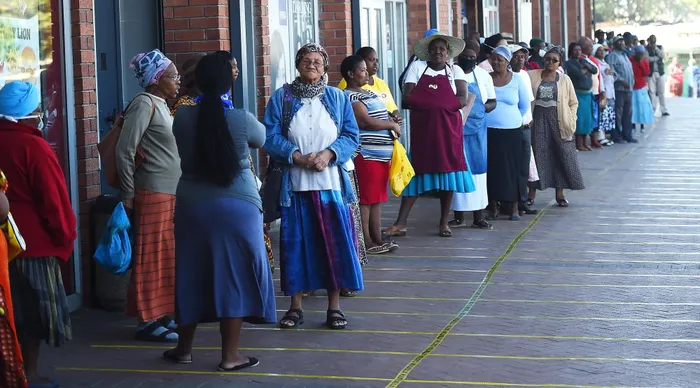A human right, political tool or a vehicle for self-enrichment?

Picture: Phando Jikelo/African News Agency (ANA) / March 31, 2020 – Elderly residents in Khayelitsha queue to shop at a local supermarket after receiving their social grants. After the advent of democracy in 1994, the number of people who are receiving social grants has increased from 2.5 million to more than 26 million recipients, the writer says.
By Bheki Mngomezulu
The advent of democracy in 1994 ushered in a new phase in South Africa’s political dispensation. As politicians prepared for the much-anticipated first democratic election, the country was engulfed by euphoria and ecstasy. There was optimism about the post-apartheid era.
Indeed, when South Africa became a democracy in 1994, there was a deliberate attempt to bring back people’s dignity. Social grants were perceived as one of the mechanisms through which the government could guarantee human dignity.
At that time, about 2.5 million people received social grants. These included disability grants, old-age grants, as well as state maintenance grants. Later, the state maintenance grant was renamed “child support grant”. A few years later, no fewer than 26 million South Africans received grants of one form or another through the South African Social Security Agency (Sassa).
The question becomes: Does the social grant system fulfil its strategic objective? If not, what are the impediments? Importantly, what should the government do to ensure that the grant system is transformed such that it is able to fulfil its original mandate?
As would be expected, the point of departure is the Constitution. Chapter 2 which focuses on the Bill of Rights provides a list of rights which everyone in South Africa must enjoy. Rights such as equality, life, housing and access to health facilities are all important rights enshrined in the Constitution.
These and other rights are encapsulated in Section 10 of the Constitution which states that “everyone has inherent dignity and the right to have their dignity respected and protected”. In this regard, social grants fit neatly within this constitutional mandate.
There is no doubt that social grants were introduced with good intentions. However, while it would be wrong to proffer the idea that they are useless and ineffective, it is equally true that the grants do not fulfil their strategic mandate to alleviate poverty and restore human dignity. There are various reasons for that which shall be enumerated below.
First, corruption has become one of the nemeses for the failure of the grant system. This is epitomised by some heartless thieves making grant recipients join bogus insurance companies, officials paying grants to ghost recipients, diverting grant money to other locations and cashing them out from there and establishing companies which become conduits in moving grant funds to high-profile individuals. Both the public and private sectors are implicated in the corrupt activities.
Second, social grants are used as a political tool. They are used to score cheap political points. On the eve of an election, the governing party boasts about giving grants to many citizens. Politicians put emphasis on the grants to bolster their chances of winning an election, with some making false claims that if the governing party were to relinquish power, the provision of social grants would stop. Surely, this is not true, but politicians use the strategy for political expediency.
On their part, opposition political parties blame the governing party for either failing to increase the number of people who receive social grants or for failing to increase the amounts dispatched through each grant. Others advance the argument that grants are not necessary; what people need are sustainable jobs. Thus, grants become a political tool.
What remains unclear is whether the grants were meant to be permanent or if they were deemed to be a temporary solution while the government created a conducive environment for the able-bodied people to get jobs. The conundrum is invoked against the backdrop of the sustained triple burden of poverty, inequality and unemployment.
As long as the challenges continue unabated, social grants will remain part of our lives. Similarly, with no tangible steps being taken by the government to institute punitive measures that would serve as a deterrent to corrupt activities, public and private corruption will continue to engulf the grant system. Individuals and companies will continue to use social grants for self-enrichment.
Given the realities that the country is faced with, such as load shedding, unemployment, slow economic growth, and general poverty, social grants will remain part of our social fabric. What is needed is a strategy to make them adhere to their founding mandate to assist the poor, as opposed to enriching those who are well-off.
To curb the scourge of using social grants for self-enrichment, the government must do an overhaul of the entire system.
First, it must conduct an audit of grant recipients to rid the system of those who receive grants fraudulently.
Second, the government must identify those who have corrupted the grant system and impose heavy sentences on them – including recouping all the money they have stolen.
Third, a new grant dispersal system must be created. New, vetted, employees must be recruited and trained to run the new system.
Fourth, no form of grant should be given to a private company to run it. Everything must be done in-house.
Fifth and last, the government must establish a monitoring unit which must provide quarterly reports so that there can be quick interventions.
To stop politicians from using social grants to score political points, political education should be provided to citizens. They must be made aware that the provision of social grants is not dependent on the governing party. Conversely, it is a constitutional obligation which all political parties must adhere to once in office.
Prof Bheki Mngomezulu is Director of the Centre for the Advancement of Non-Racialism and Democracy at the Nelson Mandela University.